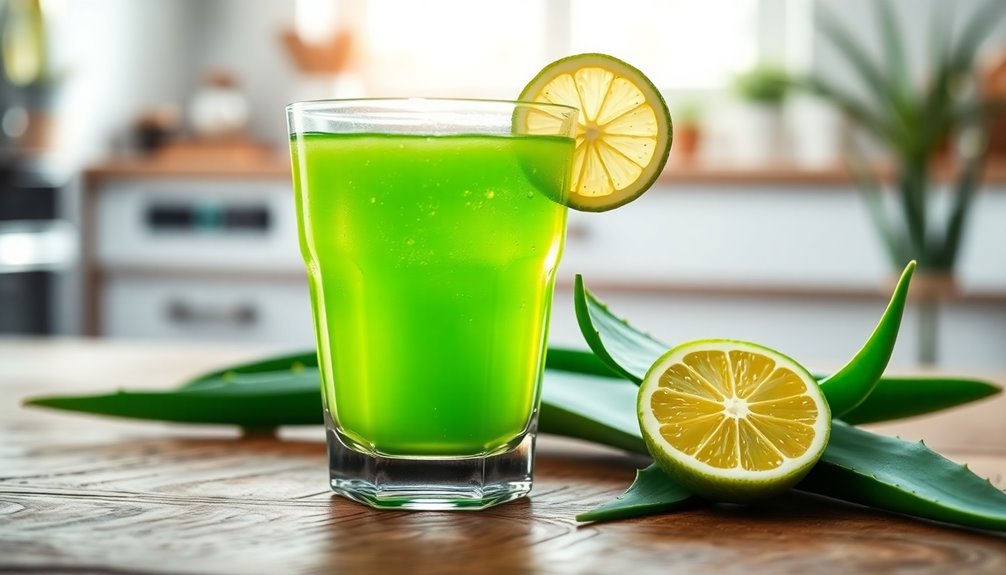When it comes to drinking aloe vera juice, you should aim for 2 to 4 tablespoons daily, but start small to gauge your body's reaction. This keeps the benefits flowing while minimizing potential side effects like cramps or diarrhea. If you have gastrointestinal issues, proceed with caution or consult your doctor. Remember, individual tolerance varies, and knowing how to use aloe vera juice safely can enhance your health journey. Discover more about its benefits and best practices.
Key Takeaways
- The recommended daily serving size of aloe vera juice typically ranges from 2 to 4 tablespoons.
- Start with small amounts to assess individual tolerance and avoid gastrointestinal issues.
- Consult a healthcare professional for personalized advice, especially if you have specific health conditions.
- Monitor your body's reaction to prevent adverse effects like diarrhea or abdominal cramps.
- Pregnant and breastfeeding individuals should seek medical guidance before consuming aloe vera juice.
Understanding Aloe Vera Juice vs. Gel
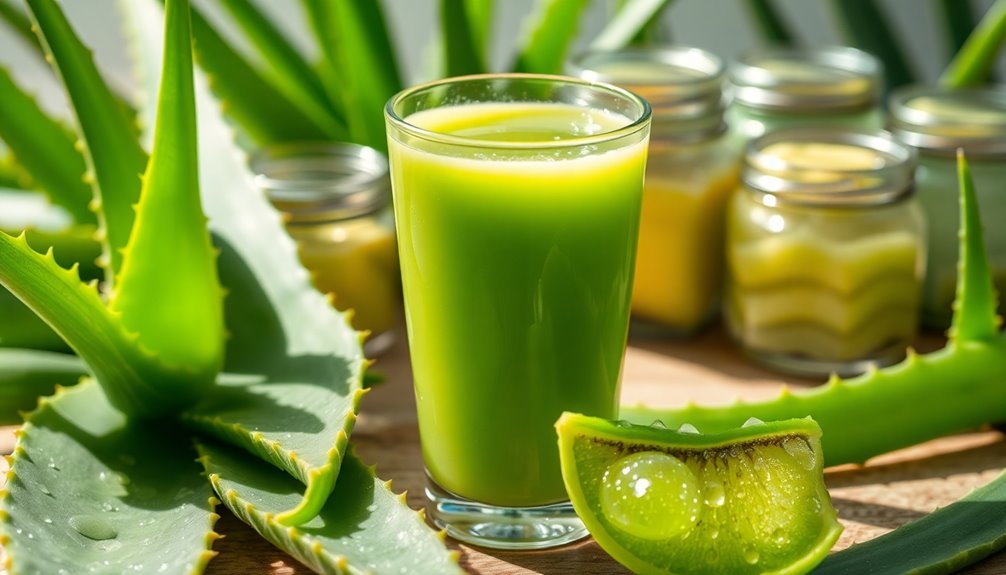
When you're exploring the benefits of aloe, it's essential to understand the difference between aloe vera juice and gel.
Aloe vera gel is meant solely for topical use, while aloe vera juice is specifically designed for drinking. This distinction matters for your health and wellness.
Aloe vera juice, derived from various parts of the plant, offers significant health benefits, particularly for digestion and constipation relief.
In contrast, aloe vera gel lacks any internal health benefits and can even be harmful if consumed.
By understanding these differences, you can make informed choices that enhance your nutritional benefits and overall well-being.
Health Benefits of Aloe Vera Juice
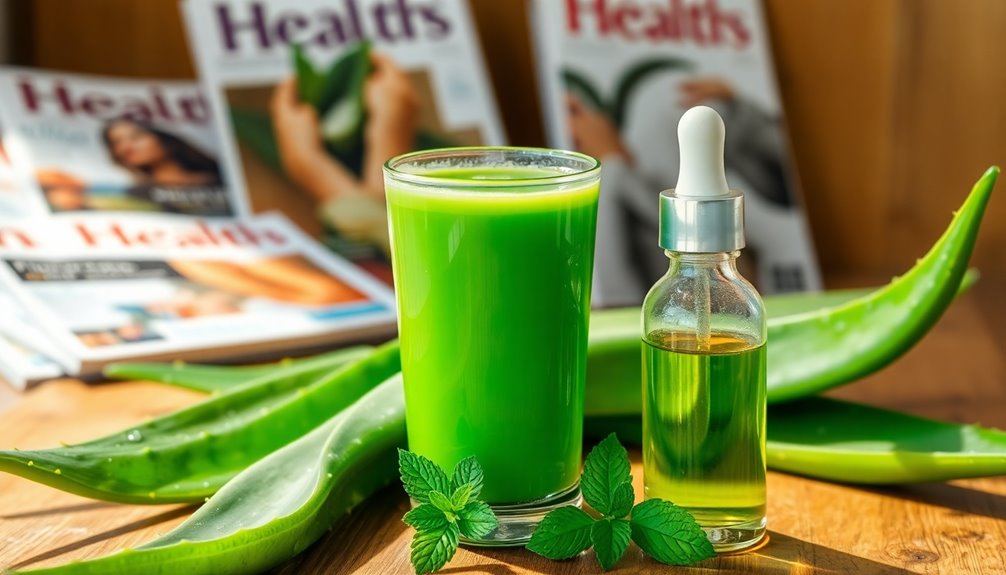
Aloe vera juice offers a range of health benefits that can greatly enhance your well-being. It's packed with vitamins, enzymes, and amino acids that support overall health.
If you struggle with constipation, aloe vera juice acts as a natural laxative, providing relief within hours. The inner part of the aloe leaf promotes better nutrient absorption, making it more beneficial than whole leaf juice.
Additionally, its naturally occurring polysaccharides enhance nutrient absorption, especially when taken with supplements.
However, be cautious with how much you consume; excessive intake can lead to harmful side effects. Enjoy this nutrient-rich juice in moderation to harness its health benefits while ensuring your safety.
Recommended Serving Sizes
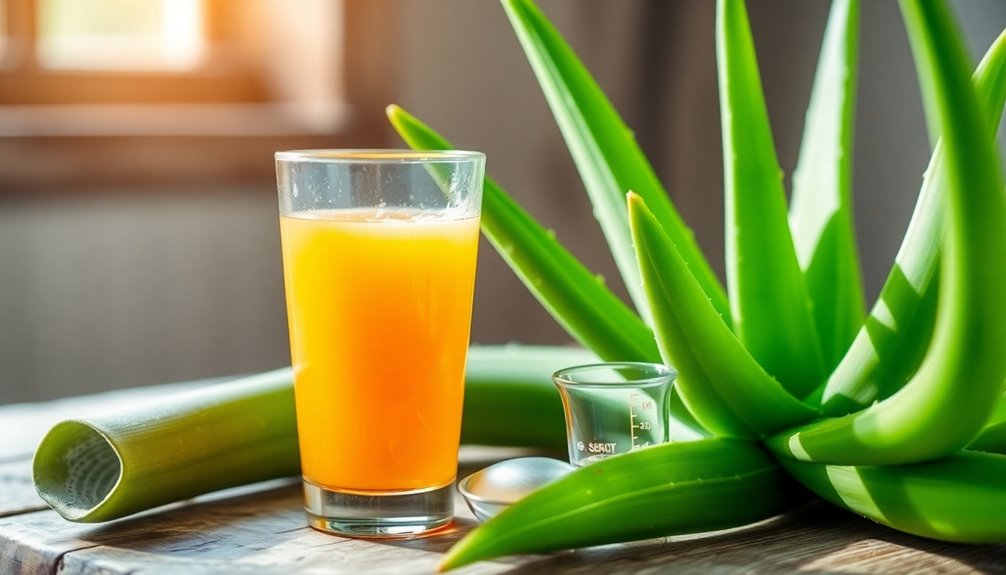
When it comes to aloe vera juice, the recommended serving size usually ranges from 2 to 4 tablespoons daily, but it can vary based on your health needs.
Always consider your individual tolerance and consult with a healthcare professional to find the right amount for you.
Don't forget to check the product packaging for specific guidelines, as different brands may have unique recommendations.
Daily Serving Guidelines
Determining the right daily serving size for aloe vera juice is essential for maximizing its health benefits. Many products recommend up to four tablespoons (60 ml) per day for ideal results.
Always check the specific instructions on your product's packaging, as some varieties, like those blended with coconut water, might allow for larger servings due to their formulations.
It’s also important to consult a healthcare professional before adding aloe vera juice to your routine, especially for regular consumption. A healthcare professional can provide personalized advice based on your health history and current medications. Additionally, considering the potential aloe juice benefits for blood sugar, it may be particularly beneficial for individuals managing diabetes. However, it’s crucial to approach its use with caution, as excessive consumption can lead to unwanted side effects. Furthermore, incorporating aloe vera juice into a balanced diet may help enhance overall wellness and may complement other lifestyle changes aimed at promoting better health. Those looking to improve blood sugar with aloe should carefully monitor their response to the juice, as individual reactions can vary. Ultimately, adopting a holistic approach that includes dietary choices, physical activity, and regular medical check-ups can yield the best outcomes in managing blood sugar levels effectively.
Keep in mind your personal tolerance and any health conditions you might've that could affect how safely you can consume aloe vera juice. Staying informed will help you enjoy its benefits while minimizing any potential risks.
Individual Health Considerations
Understanding your individual health needs is essential when considering aloe vera juice intake. The recommended serving size can vary, but moderation is key. Here are some guidelines to keep in mind:
- Consult a healthcare provider: Before you start drinking aloe vera juice regularly, especially if you have existing health conditions.
- Stick to 1-4 tablespoons: Many brands suggest this amount for adults, but listen to your body and adjust accordingly.
- Choose inner leaf juice: This type promotes better nutrient absorption, enhancing potential health benefits.
Always read the packaging instructions and be aware of your personal tolerance levels. Excessive consumption can lead to adverse effects, so prioritize a balanced approach to enjoy aloe vera juice safely.
Risks of Excessive Consumption
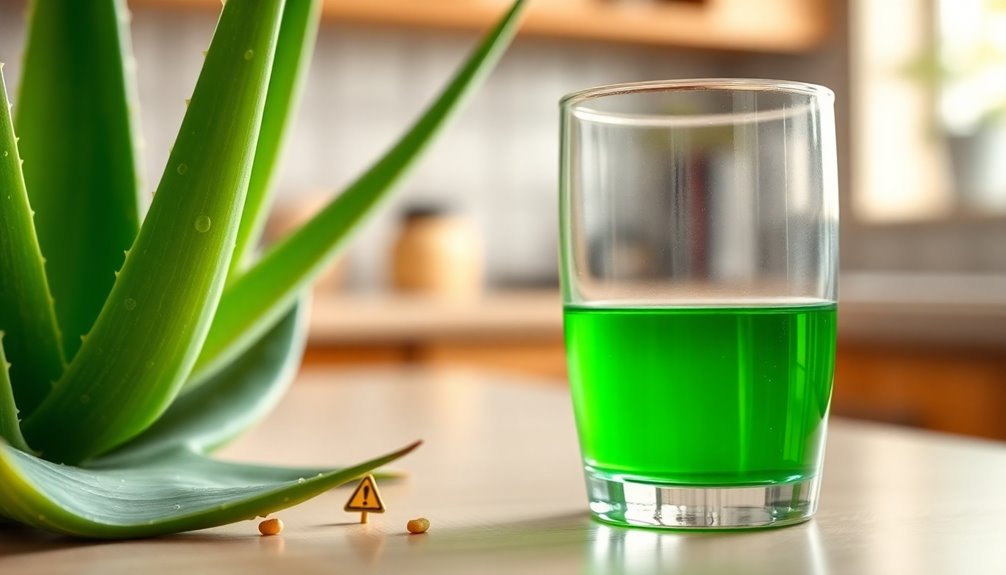
You should be cautious about consuming too much aloe vera juice, as it can cause serious gastrointestinal issues like diarrhea and cramps.
This laxative effect may also hinder your body's ability to absorb essential nutrients.
To stay safe, it's best to limit your intake and consult a healthcare professional if you're unsure.
Laxative Effects Risks
While aloe vera juice is often praised for its health benefits, excessive consumption can lead to significant laxative effects, which pose serious risks.
If you overdo it, you might experience:
- Diarrhea and Dehydration: High doses can cause severe diarrhea, leading to dehydration.
- Abdominal Cramping: Aloe vera juice, especially those with aloin, can result in painful cramping and discomfort.
- Dependency on Laxatives: Continuous high intake might disrupt your bowel function, making you reliant on laxatives for regularity.
To avoid these issues, stick to the recommended serving size of one to four tablespoons per day.
If you have underlying health conditions or take medications, it's wise to consult a healthcare professional before adding aloe vera juice to your diet.
Nutrient Absorption Limitations
Excessive intake of aloe vera juice not only risks laxative effects but can also hinder nutrient absorption in the body. When you consume high doses, you might experience gastrointestinal disturbances like abdominal cramps and diarrhea.
These issues can lead to dehydration and electrolyte imbalances, further complicating your health. While the inner leaf juice is better for nutrient absorption, moderation is key to avoid adverse effects.
Regularly drinking large amounts could even lead to serious complications, including kidney or liver damage over time. To safeguard your well-being, it's essential to consult a healthcare professional before making aloe vera juice a regular part of your routine, especially in large quantities.
Prioritize balance and listen to your body's signals.
Nutrient Absorption and Sources

When it comes to maximizing the health benefits of aloe vera juice, understanding the source is essential. The inner part of the aloe leaf is your best bet for nutrient absorption.
Here are three key reasons to opt for inner leaf juice:
- Higher Nutrient Absorption: Inner leaf juice promotes better absorption compared to whole leaf juice.
- Polysaccharide Benefits: Aloe polysaccharides enhance nutrient absorption, especially when taken with supplements.
- Product Selection: Choose products that clearly state they use the inner leaf to optimize nutrient delivery.
Taste and Flavor Considerations
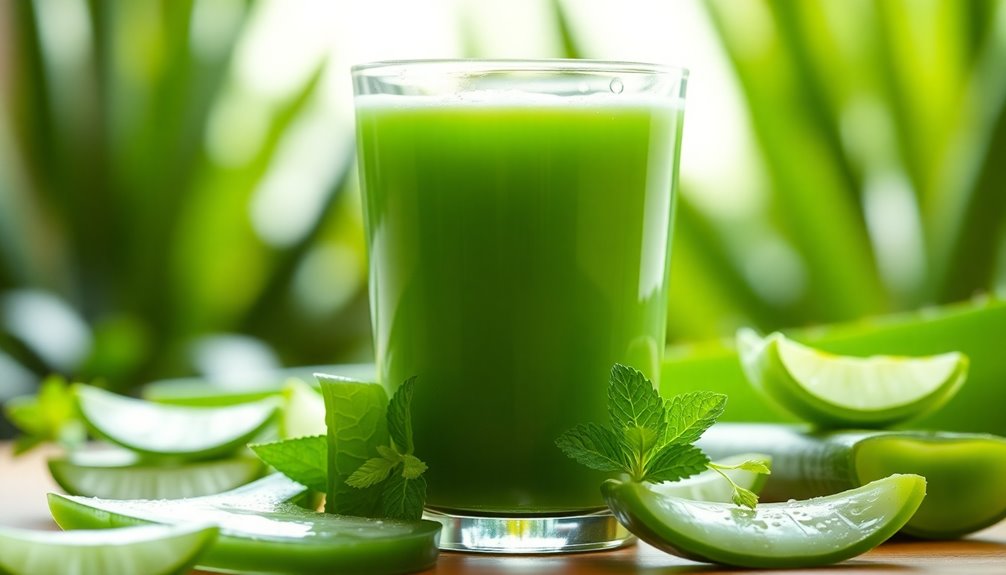
Although aloe vera juice offers numerous health benefits, its taste can be a hurdle for many people. The juice typically has a slightly bitter and pungent flavor that mightn't be appealing to everyone.
If you find the taste off-putting, you're not alone; many brands exhibit significant variations in flavor and intensity. Some individuals may even experience an aftertaste that can detract from their enjoyment.
To guarantee you can consume aloe vera juice regularly, it's essential to find a palatable option that suits your taste preferences.
Keep in mind that mixing it with other beverages, like smoothies or fruit juices, can help enhance the flavor while masking the bitterness, making it easier for you to incorporate into your routine.
Mixing Aloe Vera Juice for Better Taste
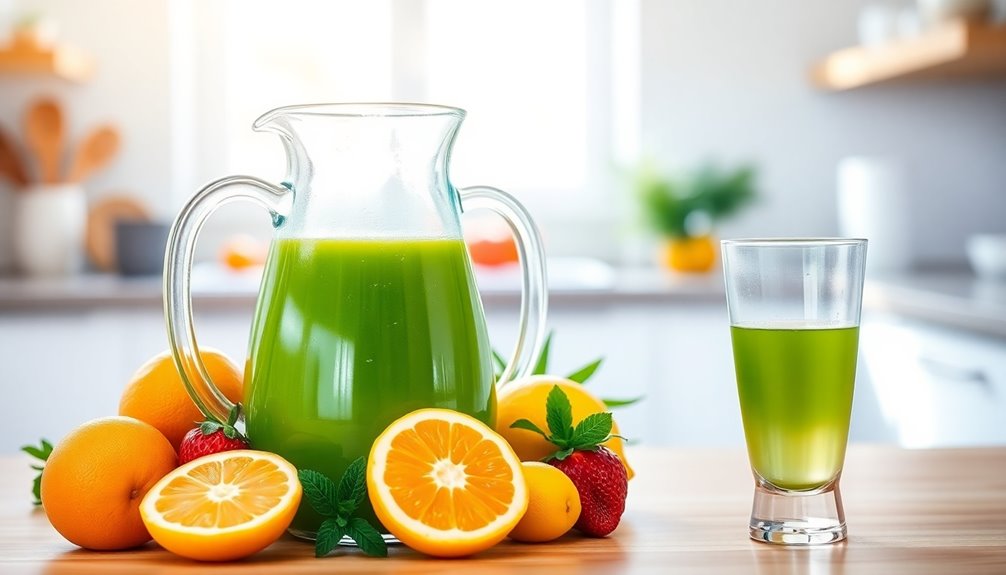
To enhance the taste of aloe vera juice, consider mixing it with complementary beverages. The slightly bitter and pungent flavor can be easily mitigated by trying different combinations.
Here are three excellent mixers to try:
- Coconut Water: This adds a revitalizing flavor and hydration while masking the bitterness.
- Citrus Juices: Mixing with orange or lemon juice not only enhances flavor but also provides extra nutritional benefits.
- Smoothies: Blend aloe vera juice with your favorite fruits for a delicious and nutritious drink.
Experimenting with different ratios of aloe vera juice to these mixers will help you find the perfect balance that suits your taste buds.
Taste testing various brands of aloe vera juice can also lead to a more enjoyable experience!
Personal Tolerance and Health Conditions
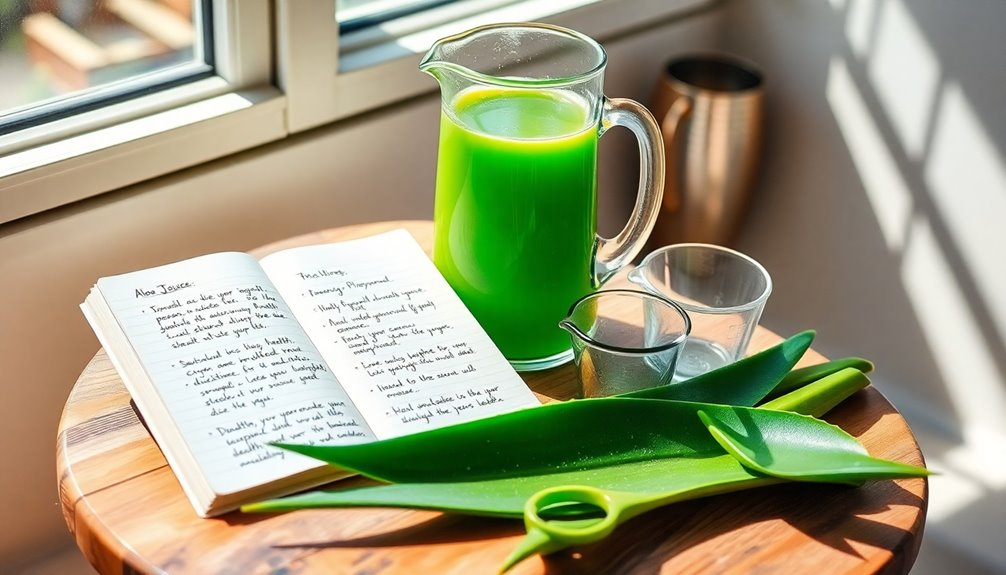
Understanding your personal tolerance for aloe vera juice is essential, as individual reactions can vary greatly. Start with small amounts to see how your body responds. If you have gastrointestinal disorders, be cautious, as aloe vera can increase sensitivity. Pregnant or breastfeeding? It's wise to consult a healthcare provider before consuming it, as it may affect health and nutrition. Those with a history of bowel issues should also be careful, as aloe vera acts as a laxative and can worsen your condition. Always monitor your body's reaction because excessive intake can lead to cramping and diarrhea.
| Condition | Caution Level | Recommended Action |
|---|---|---|
| Gastrointestinal Disorders | High | Consult a healthcare provider |
| Bowel Issues | Very High | Limit or avoid consumption |
| Pregnant/Breastfeeding | High | Seek medical advice |
| General Consumption | Moderate | Start with small amounts |
Consulting With a Health Professional

Before you start drinking aloe vera juice regularly, it's important to consult a healthcare professional, especially if you have any underlying health conditions or are taking medications. A doctor can offer personalized advice to guarantee you consume it safely.
Here are a few key reasons to seek guidance:
- Serving Size Recommendations: They can suggest the right amount based on your health status and nutritional needs.
- Monitor for Adverse Effects: Excessive intake can cause issues like diarrhea or abdominal cramps, so regular monitoring is vital.
- Identify the Right Form: Health professionals can help you choose between whole leaf and inner leaf options for maximum benefits.
Consulting a healthcare provider promotes safe consumption practices and helps avoid potential interactions with other supplements or medications.
Frequently Asked Questions
How Much Pure Aloe Vera Juice Should I Drink?
You should start with small amounts of pure aloe vera juice to see how your body reacts.
Most recommendations suggest up to four tablespoons, or about 60 ml, daily for health benefits.
However, moderation is essential, as drinking too much can cause issues like diarrhea and cramps.
Always consult a healthcare professional before adding it to your routine, especially if you have health concerns or are pregnant.
Follow the product instructions for best results.
What Happens if I Drink Aloe Vera Juice Every Day?
If you're thinking of drinking aloe vera juice every day, you're stepping into a double-edged sword.
On one hand, it can boost digestion and relieve constipation, making you feel great.
But on the other hand, too much can lead to uncomfortable side effects like dehydration and cramps.
Stick to a few tablespoons daily, and always consult your healthcare provider to guarantee it fits your health needs.
Moderation is key to enjoying its benefits!
Does Drinking Aloe Vera Juice Really Work?
Drinking aloe vera juice does work for many people, especially for its natural laxative properties which can relieve constipation.
You'll find it packed with vitamins and nutrients that support your overall health.
However, the taste can be a bit bitter, so mixing it with smoothies or coconut water can help.
How Much Forever Aloe Vera Juice to Drink Daily?
When it comes to how much Forever Aloe Vera Juice you should drink daily, start with one tablespoon and see how your body reacts.
Gradually increase to about four tablespoons (60 ml) if you feel comfortable.
Stick to the inner leaf juice for better nutrient absorption, and be cautious—too much can have a laxative effect.
Remember to check in with a healthcare professional before making it a regular part of your routine.
Conclusion
To sum up, when it comes to aloe vera juice, moderation is key. Remember, "too much of a good thing can be bad." Stick to the recommended serving sizes to enjoy its health benefits while minimizing risks. Always listen to your body and be mindful of any personal health conditions. If you're unsure, don't hesitate to consult a health professional for guidance. With the right approach, you can savor the goodness of aloe vera juice safely!
Cindy thoroughly researches juicing trends, techniques, and recipes to provide readers with practical advice and inspiration. Her writing style is accessible, engaging, and designed to make complex concepts easy to understand. Cindy’s dedication to promoting the advantages of juicing shines through her work, empowering readers to make positive changes in their lives through the simple act of juicing.

